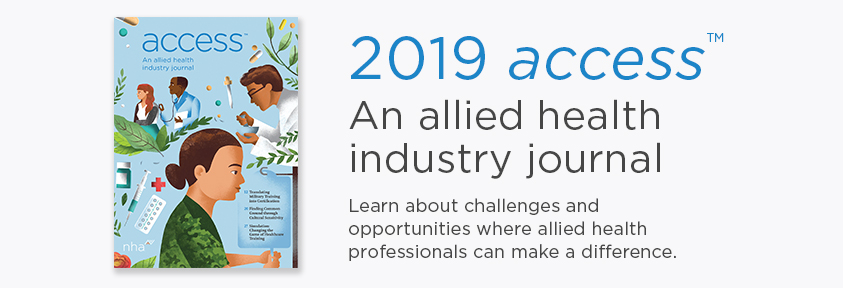The U.S. Bureau of Labor Statistics projects allied health professions will grow at rates that far exceed the U.S. average for all occupations. This should tell us that a visit to our doctor’s office today could look different tomorrow, and again, a year from now.
What remains constant in this evolution of healthcare? The impact that medical assistants have in all models of care.
They are scribes, they are health coaches, they are patient advocates, they are scheduling and care team coordinators, and so much more. Medical assistants are an integral part of the clinical happenings and business operations within a practice. Therefore, there is great benefit to empowering them and investing in their career satisfaction and success.
Over time, by leveraging training opportunities, certification and continuing education, you can help MAs work at the top of their credential by expanding their role and responsibilities. This is especially critical as your practice continues to evolve with the ever-changing healthcare landscape. If initiatives such as population health management, patient-centered or team-based care become a priority, let your MAs lead.
After many hours of consulting with those who educate, train and work beside medical assistants, we have learned four ways to prepare the care team as you implement a transformative framework for change such as team-based or value-based care.
- Plan for change
- Create a patient-centered environment
- Empower your people
- Practice business efficiency by establishing a common language and standardized learning
1. Plan for change
The only real way to plan for change is to give your team skills and competencies that can be measured. Help your staff, your administrators, and most importantly your patients see the change through measurable results. Set goals at the group level and clarify the contributions necessary from each individual to meet them. This will help provide operational readiness before you hit go. If you get your MA’s excited about change and the opportunity to shine as leaders, they can rally the team.
Learn about training from NHA that can help your team make the transition to team-based care.
2. Create a patient-centered environment
Provide your patients with continuity in their care team to allow relationships to form. This alone can increase patient satisfaction and help them feel like a partner in their own care. Medical assistants become trusted advisors to both providers and to patients during repeat-visits with a population panel. The very best MAs are warm and caring, empathetic, and are trained to ask the right questions to better understand their patients’ lifestyles, motivations and health goals. They are also in the perfect position to pro-actively offer preventative screenings to keep the population healthy. All members of the team must understand the basics of population health management and medical assistants can lead the way. Encourage them represent the voice of your patients, after all they are likely spending the most time with them during a visit.
3. Empower your people
Give those in your practice the autonomy to define and divide the workload amongst team members so that the patient gets the right care, at the right time, by the right member of the team. They should all have a shared responsibility next to the practitioner to participate in decision-making and coordination of care. Medical assistants can learn and direct workflows and network with your patients acting as their healthcare navigator.
4. Practice business efficiency
There are many ways to find business efficiencies but practicing them can be the hard part. It takes discipline and a commitment from the entire team. A good place to start is with standardized learning- a multidisciplinary team should participate in training together to create a common language and better understand each role and how they interact. Find the sweet spot where each individual’s expertise is used in collaboration. Even better, co-locate the team so the medical assistants, nurses and physician providers sit together. Proximity will improve team communication. Allow your MAs to lead team huddles and provide direction to the care team and back to the patient.
Care models are changing, and experts predict that value-based care is becoming the wave of the future. Systems are slowly walking away from the fee-for-service model as patients are becoming consumers and the keepers of their own care. Encourage your medical assistants to take the lead and become the care team conductors- they are fully capable.





